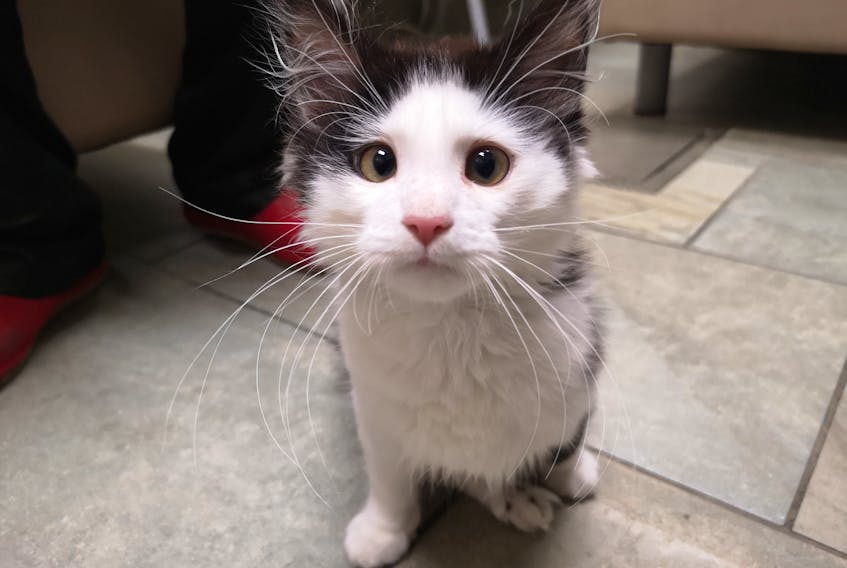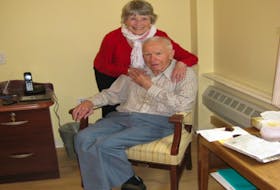If it had been 10 years ago, it would be considered humane to euthanize Pickles due to his deformity, says Ashley Harvey, associate veterinarian with the C.B.S. Animal Hospital.
“If the average person had found this kitten, he probably would have been,” Harvey says.
Pickles is a four-month-old kitten at the C.B.S. Animal Hospital who is now ready for adoption.
He’s an unusual feline — his back legs tend to flop around when he moves, because of a rare condition called tibial hemimelia.
“(It’s) a big fancy word for saying the tibia’s (bones) in his back legs didn’t form,” Harvey says. “It is a rare congenital condition, so he was born like this.”

Without the tibia bones, his back legs don’t have the strength needed to stay in a straight position and have rotated. Because of this, his back legs look upside down, with his paws facing upward. However, Harvey says this doesn’t bother Pickles or even slow him down.
“He’s adapted to this condition and actually just walks using his front legs,” she said. “He will use one his back legs almost like a crutch sometimes to give him a little bit of extra balance, but he doesn’t bare weight on either one.”
Pickles showed up at the C.B.S. Animal Hospital through the SPCA’s Preventing Unwanted Pets (PUP) program.
SPCA executive director Karen Mahoney says the PUP program was put in place three years ago to help control the pet population.
“When we take the kittens (or puppies), we know that they’re spayed or neutered and they’re not going to reproduce,” Mahoney says.
Last year, 160 animals were spayed. Mahoney says by doing this, free of charge — and judgment — they prevent the births of potentially thousands of unwanted animals that may end up living in less-than-ideal conditions.

When Pickles was brought to the SPCA, the staff, realizing something was different, called Mahoney upstairs to look at him.
“They were like, ‘Oh god, what are we going to do?’ and I said, 'We’re going to send him to Ashley (and) he’s going to be fine,'” she said. “His disability is not taking away from his character at all, it’s giving him character.”
Pickles still had to be assessed to make sure complications were unlikely and, if needed, to see if the SPCA could afford to address them, Harvey says.
“He is actually not in any pain whatsoever with those legs,” Harvey said. “He can move them, he can bend them, he can do everything normally like that, he just can’t (put) weight on them.”
The next step was to assess his quality of life. That’s when she looked to Jessie Marie Fewer for help.
Fewer is a veterinary assistant at the C.B.S. Animal Hospital, who often fosters pets with medical conditions. Her goal was to see if Pickles is capable of doing the things a cat needs to do, like walking up a flight of stairs or using the litter box.
As it turns out, he’s quite capable of doing those things unassisted. However, Fewer did notice he had some other abnormalities.
“I have to watch him because he’s after coming up and stealing a piece of popcorn out of my bowl and taking off with it,” she said. “I’ve never seen a cat eat a chip or popcorn before.”
If you play with him, his eyes cross.
“But (they) come back after a few minutes,” she said.

When she first took him home, Pickles made his way over to Fewer’s German shephard, Duke, and let out a big hiss. Thankfully, Duke ignored him.
Now, Pickles and Duke, her Maltese Milo and her three-legged cat, Greg, are all best friends who cuddle and groom each other, she says.
That is, until Friday, when Pickles will go up for adoption at the SPCA.
“I’m jealous,” Fewer says. “I would like to keep him, but I have too many creatures of my own.”
Besides, Harvey says there is an ongoing need to have someone who is able to foster animals with medical needs.
To see the SPCA capable of helping exceptional cats like Pickles makes her heart explode, Harvey says.
“Just because he looks funny doesn’t mean anything is wrong,” Harvey says, before pointing out his little nub of a tail.
“He’s special in many ways,” she says.
“And you’d think with his mobility he’d be a little bit more nervous, but no, he is such a confident little kitten. He’s ready to take on the world.”
Twitter: @andrewLwaterman









